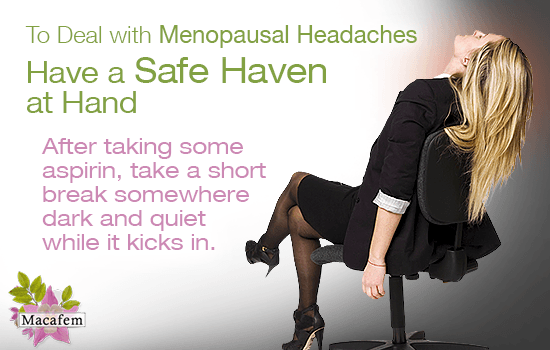5 Strategies to Deal with Menopausal Headaches While Macafem Does Its Job
Headaches are often more frequent and more intense during menopause, thanks in no small part to hormonal imbalance. Restoring your endocrine system back to full health will take some time and a sensible combination of Macafem and healthier habits. However, in the meantime, it’s best to have a few tricks up your sleeve to deal with recurring menopausal headaches. Keep reading to learn more about five strategies that can help, or research more about Macafem and headaches.

1. Have a Safe Haven at Hand
Specific management techniques will vary greatly depending on the type of headache (migraines tend to be much more disruptive than tension or sinus headaches), but it’s a safe bet that noisy, chaotic environments will not be the gentlest. It’s best to try to identify and set up a dark, quiet room beforehand so that you can take a 20-minute break to compose yourself while your ibuprofen or aspirin kicks in. It can be a bathroom stall, an empty office at work, or you bedroom at home, provided nobody will disturb you.
2. Give Yourself a Localized Massage
Most tension or sinus headaches are quite responsive to head massages, especially in the temples, scalp, and neck. Simply rub your temples with your own fingers, or gently tug at medium-sized strands of your hair in order to get the blood circulating and relieve the pain. In the case of sinus headaches, softly massaging your eyelids or the sides of your nose with your thumbs can also help.
3. Use Cold Compresses
When pain becomes too intense or comes in sharp bouts – like migraines are known to do – a good option is to use a cold compress on your forehead. Just moisten a small tower with chilled water and apply it for two minutes at a time. If possible, try to mix the water with some mild cologne, especially one with a relaxing scent – such as chamomile or passionflower – or add a couple of drops of an analgesic or anti-inflammatory essential oil, like valerian or turmeric.
4. Mind Your Caffeine Intake
Since definitive relief for menopausal headaches can take a while to be achieved, it’s important to avoid unnecessary triggers in the meantime. Try to monitor your caffeine intake and make sure you are not taking more than your body is used to, but don’t try abruptly lowering either: abstinence syndrome is a major cause of sharp headaches. Look for less obvious sources of caffeine, such as sodas or coffee chocolates.
5. Keep a Headache Diary
Although not an immediate coping technique, a headache diary will help you track your symptoms, identify potential triggers, and recognize which coping techniques work best. In addition, watching how your headaches begin to slowly decrease will help you evaluate the benefits you are getting from Macafem, as dosages and time frames tend to vary.
As disruptive and debilitating as they are, rest assured that complete relief for menopausal headaches is near. In the meantime, combine these strategies with an improved diet and fitness regime to begin noticing the many benefits of a healthier, fuller you!
National Library of Medicine. (2013). Managing Tension Headaches at Home. Retrieved January 29, 2015, from http://www.nlm.nih.gov/medlineplus/ency/patientinstructions/000421.htm
Quinn, C., Chandler, C. & Moraska, A. (2002). Massage therapy and frequency of chronic tension headaches. American Journal of Public Health, 92(19), 1657-61. Retrieved from http://www.ncbi.nlm.nih.gov/pmc/articles/PMC1447303/

